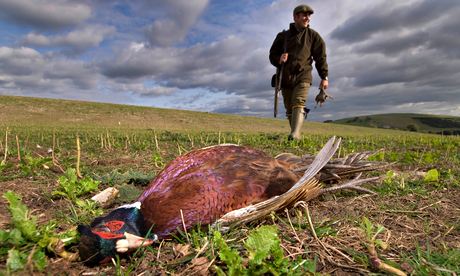
A few days after it was revealed that an NHS group is considering charging patients for the crutches, walking sticks and neck braces it issues, we discovered that David Cameron has intervened to keep the cost of gun licences frozen at £50: a price that hasn’t changed since 2001. The police are furious: it costs them £196 to conduct the background checks required to ensure shotguns are issued only to the kind of dangerous lunatics who use them for mowing down pheasants, rather than to the common or garden variety. As a result they – sorry, we – lose £17m a year, by subsidising the pursuits of the exceedingly rich.
The Country Land and Business Association – the armed wing of the Conservative party – complains that it’s simply not fair to pass on the full cost of the licence to the owners of shotguns; unlike, say, the owners of passports or driving licences, who are charged on the basis of full cost recovery.
Three days later the government announced it would raise the subsidy it provides for grouse moors from £30 per hectare to £56. Yes, you read that right: the British government subsidises grouse moors, which are owned by 1% of the 1% and used by people who are scarcely less rich.
While the poor are being forced out of their homes through government cuts, it is raising the payments – across hundreds of thousands of hectares – that some owners use to burn and cut the land (helping to cause floods downstream), shoot or poison hen harriers and other predators, and scar the hills with roads and shooting butts.
While the rest of us can go to the devil, the interests of the very rich are ringfenced.
Before examining the wider picture, let’s stick with the shooting theme for a moment, and take a look at the remarkable shape-shifting properties of that emblem of Downton Abbey Britain: the pheasant. Through a series of magnificent legal manoeuvres it can become whatever the nation’s wealthy want it to be.
When pheasants are reared, they are classed as livestock: that means the people who raise them are exempt from some payments of value added tax and certain forms of planning control, on the grounds that they are producing food.
But as soon as they’re released they are classed as wild animals. Otherwise you wouldn’t be allowed to shoot them. But if you want to re-capture the survivors at the end of the shooting season to use as breeding stock, they cease to be wild and become livestock again, because you aren’t allowed to catch wild birds with nets.
If, however, pheasants cause damage to neighbouring gardens, or to cars, or to the people travelling in those cars, the person who released them bears no liability, because for this purpose they are classed as wild animals – even if, at the time, they are being rounded up as legal livestock.
The pheasant’s properties of metamorphosis should be a rich field of study for biologists: even the Greek myths mentioned no animal that mutated so often. In the treatment of pheasant and grouse shoots we see in microcosm what is happening in the country as a whole. Legally, fiscally and politically, the very rich are protected from the forces afflicting everyone else.
But to call on the government to make rational and progressive fiscal decisions, as many of us do, is to misunderstand what it is attempting. It is not seeking to save the country from fiscal ruin – there are many ways of doing that without cutting essential services. It is re-engineering the United Kingdom as a plutocrats’ paradise, in which the rich are scarcely troubled by laws or taxes, while the poor are plunged into a brutal world of casual labour, insecurity and legal restraint. It is creating a world in which the rich may live by their own rules.
So back we go to the hazy days of Edwardian England: a society dominated by rentiers, in which the city centres are set aside for those with tremendous wealth and the countryside is reserved for their bloodsports. As the queues lengthen at the foodbanks, our money is used to subsidise grouse and shotguns. That is all you need to know about how and by whom we are governed.
